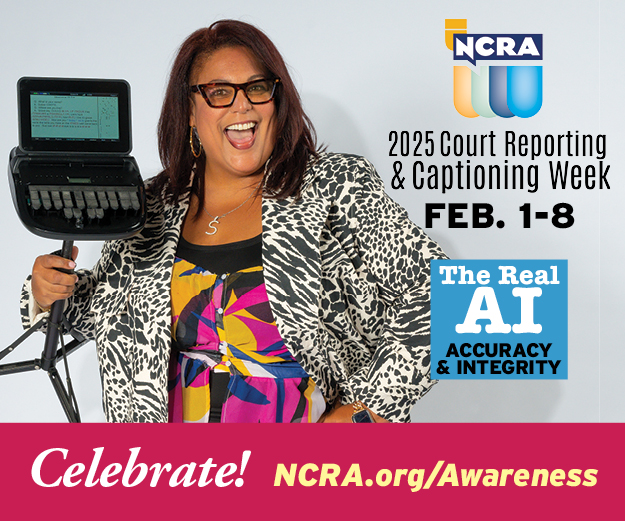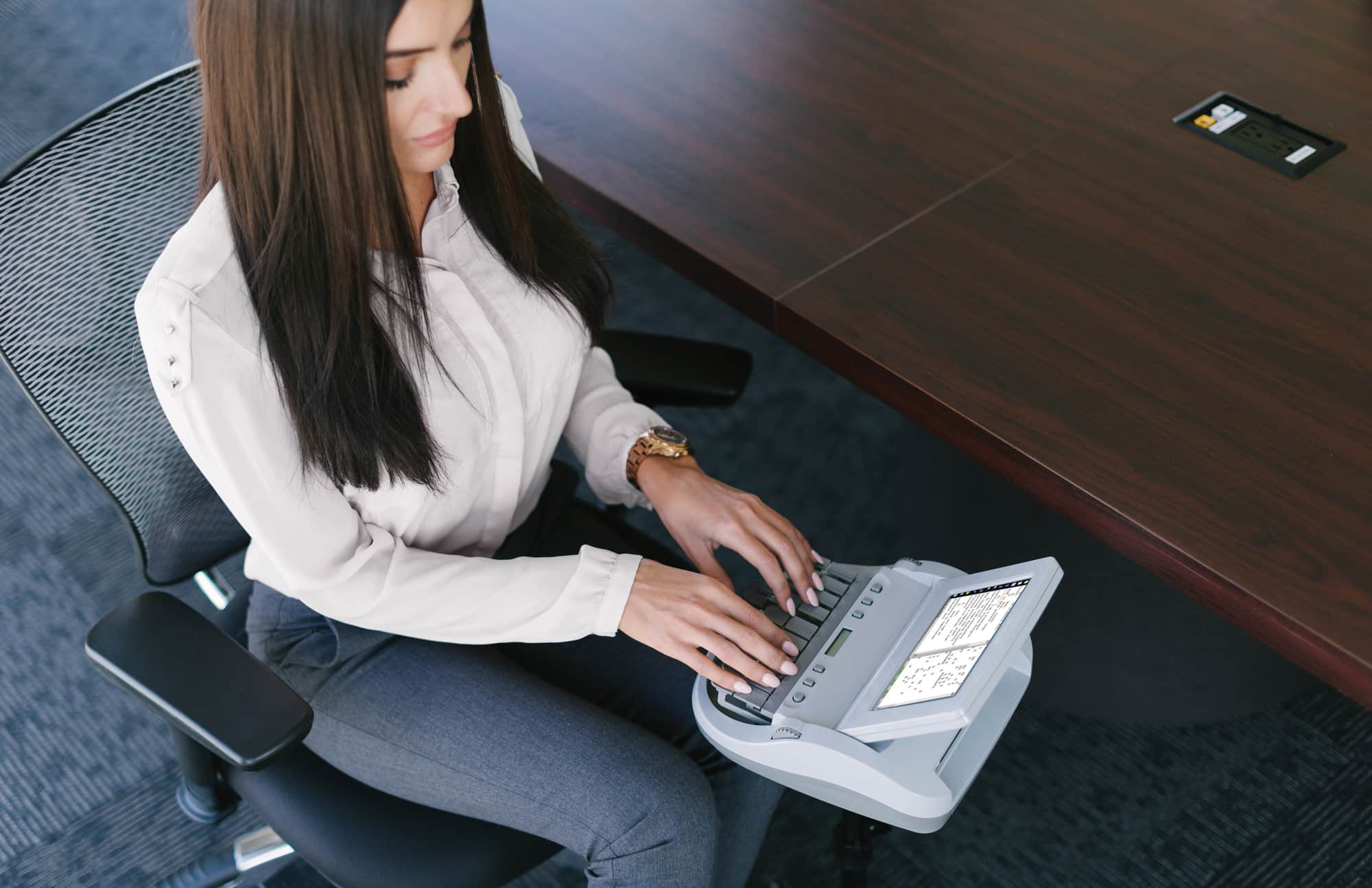How court reporting Professionals Capture Multiple Speakers in High-Pressure Trials
How court reporting Professionals Capture Multiple Speakers in High-Pressure Trials
Blog Article

The Future of Court Reporting: Advancements and Patterns Forming the Sector
As you discover the future of court coverage, you'll notice a shift driven by technology and advancement. Real-time transcription and AI applications are improving just how legal proceedings are recorded. It elevates questions about the role of court press reporters and the abilities they'll need relocating onward.
The Influence of Artificial Knowledge on Court Coverage
As artificial intelligence proceeds to progress, it's reshaping the landscape of court reporting in ways you could not anticipate. AI can assess vast quantities of lawful message, assisting you identify pertinent criteria and simplify case prep work.
In addition, AI can boost the preparation process by offering predictive analytics, which can aid you prepare for test outcomes based on historic data. With AI handling regular jobs, you can focus much more on your core responsibilities, such as making certain accuracy and supplying essential legal understandings.
Real-Time Transcription: Enhancing Precision and Efficiency
Real-time transcription has actually changed the court reporting process, making it easier than ever before for you to catch exact records right away. With advanced innovation, you can now offer instant transcripts during hearings or depositions, guaranteeing that all celebrations have access to vital info without hold-up. This immediacy not just improves the general effectiveness of the legal process however likewise enables you to concentrate on the discussion, as opposed to rushing to catch up.
As you utilize real-time transcription, you'll discover a substantial decrease in errors, many thanks to automated proofreading tools that flag inconsistencies as you type. In addition, clients value the ability to examine transcripts quickly, enabling quicker decision-making and smoother proceedings. By accepting this advancement, you're not just improving your workflow; you're setting a brand-new criterion in court coverage that focuses on accuracy and effectiveness. This forward-thinking strategy placements you at the leading edge of the developing legal landscape (court reporting).
The Increase of Remote Depositions

With the growing need for flexibility in lawful procedures, remote depositions have actually become a game-changer in court reporting. You can currently get involved in depositions from anywhere, eliminating travel time and prices. This convenience enables you to concentrate on what really matters-- preparing your case.
Remote depositions utilize sophisticated modern technology, making it possible for real-time interaction and document sharing. You can engage with witnesses and lawyers effortlessly, ensuring that everybody continues to be connected no matter their physical location. This method not only conserves time but also expands your swimming pool of specialist witnesses, as geographical barriers end up being less of a concern.
As remote depositions gain appeal, it's critical to adapt to this new standard. Acquaint yourself with the required devices and methods to ensure a smooth experience - court reporting. Welcoming this technology can provide you a competitive side, permitting you to browse the ever-evolving landscape of lawful process successfully
Digital Courtrooms: Changing the Lawful Landscape
As you step right into the world of electronic courts, you'll notice just how digital hearing modern technology is reshaping lawful procedures. This change not only makes accessibility much easier but likewise enhances transcription accuracy, ensuring every word is caught correctly. Accepting these developments can considerably enhance the performance of the legal process.
Digital Hearing Technology
While the typical courtroom setting has actually long been a symbol of justice, the increase of digital hearing technology is reshaping just how legal process are conducted. You'll discover that these electronic platforms use unprecedented ease of access, allowing participants to join from anywhere. This adaptability not only saves time yet also lowers expenses connected with travel and logistics. Picture having the ability to present your situation without tipping foot in a physical court room. On top of that, virtual hearings can improve involvement, enabling witnesses and professionals to give statement without the constraints of area. As you adapt to these adjustments, you'll notice that online hearings preserve the honesty of the lawful process while embracing innovation, inevitably transforming the way justice is served in the modern-day world.
Enhanced Transcription Precision
Improved transcription accuracy is revolutionizing the lawful field, making court procedures a lot more trustworthy than ever before. As a result, vital details aren't lost in translation, guaranteeing that the stability of the legal procedure is preserved. Welcoming these technologies implies you're stepping into a future where clarity and accuracy in legal paperwork are critical, ultimately benefiting all celebrations involved in the judicial system.
The Duty of Court Reporters in Virtual Hearings
Stenotype reporter play an essential duty in online hearings, assuring that every word spoken is precisely captured and transcribed in real-time. As a stenotype reporter, you facilitate interaction between celebrations, making intricate legal procedures accessible. Your expertise in lawful terms and the ability to rapidly adjust to various speakers are vital in this digital environment.
Throughout virtual hearings, you additional reading preserve a steady emphasis, also amidst technological difficulties or distractions. You supply a clear, written record that can be referenced later, aiding courts, lawyers, and customers understand the proceedings. Your skills in guiding various systems assure that you can perfectly incorporate right into any type of digital setup.
Additionally, you additionally help copyright the honesty of the judicial procedure, validating that every participant's voice is listened to. By doing this, you not just improve the efficiency of legal process however likewise add to the overall fairness and openness of the justice system.
Developments in Documents and Record Keeping
As modern technology develops, technologies in paperwork and record keeping are transforming how court press reporters catch and handle legal records. You'll find that digital tools permit for quicker and extra precise transcription, minimizing the chances of human error. Cloud-based storage options allow you to firmly store and gain access to documents from anywhere, making partnership with legal teams smooth.
Expert system is also playing a significant role, aiding with real-time transcription and even providing smart modifying functions. These advancements not just improve performance but also guarantee that you can give high-quality documents in a busy legal environment.
Furthermore, the assimilation of voice acknowledgment software enhances the procedure, enabling you to concentrate more on the subtleties of the proceedings instead of just inputting. By embracing these technologies, you're placed to boost your abilities and meet the needs of modern-day court reporting properly.
Future Abilities and Training for Court Reporters
While technology improves the landscape of legal proceedings, it's vital for stenotype reporter to adapt by getting new skills and training. You'll need to familiarize on your own with innovative transcription software and digital coverage devices to stay competitive. Welcoming man-made knowledge and real-time captioning will certainly boost your effectiveness and precision.
Additionally, developing solid research study and analytical abilities is vital. You'll commonly encounter complex lawful jargon and procedures, so recognizing legal concepts will certainly hone your reporting. On the internet courses and workshops can offer important understandings right into these areas.
Connecting with various other specialists will certainly also assist you remain upgraded on industry trends. Joining companies or going to conferences can expose you to new modern technologies and best practices.
Lastly, honing your social skills will certainly enhance communication with lawyers and clients. By concentrating on these locations, you'll place yourself for success in the evolving area of court coverage.
Frequently Asked Concerns

What Credentials Are Needed to Become a Court Press Reporter Today?
To become a stenotype reporter today, you'll need a high college diploma, specialized training in court reporting, and accreditation, frequently with a nationwide exam. Strong keying skills and focus to detail are important for success.
Exactly How Can Court Reporters Remain Updated With New Technologies?
To stay updated with brand-new modern technologies, you must attend workshops, sign up with specialist organizations, and subscribe to pertinent publications. Networking with peers and taking part in on the internet forums can additionally keep you informed concerning the most up to date innovations.
What Is the Typical Salary for Court Reporters Currently?
The ordinary income for court press reporters differs by location and go to this web-site experience, yet you can expect around $50,000 to $70,000 yearly. In some locations, experienced press reporters can make a lot more, specifically with specialized abilities.
Exist Work Opportunities for Court Reporters in Non-Legal Area?
Yes, there are job opportunities for stenotype reporter in non-legal fields. You can find functions in closed captioning, transcription solutions, and media, where your abilities in catching talked language are extremely valued and sought after.
How Does Court Coverage Differ in Different Countries?
Court reporting varies significantly across nations. You'll locate differences in terminology, modern technology, and lawful systems. As an more example, some nations highlight electronic coverage, while others still depend on typical stenography methods for recording spoken words.
Report this page